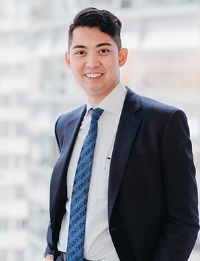As populations age and grow wealthier, and with birth rates in decline, the world has seen a strong growth in demand for healthcare in recent years. The outbreak of COVID-19 in 2020 gave a new urgency to the need to improve accessibility to healthcare and advance treatment outcomes.
The convergence of talent, investment capital and strategic location in the Guangdong-Hong Kong-Macao Greater Bay Area (GBA) is creating a wellspring of opportunity for the development of a global medtech ecosystem anchored in Hong Kong.
Opportunity knocks

Making an early bet on the opportunities being created, successful life sciences entrepreneur and investor Emmanuel Hui decided to make his move.
In December 2016, Mr Hui teamed with three professors from the Ivy League universities of Dartmouth and Harvard in the United States, launching gene therapy company Moogene in the US and Korea. Within four years, he steered the company from start-up to listing on the Korean stock exchange.
Returning to Hong Kong, Mr Hui joined Sagamore Investments, a China-focused fund of funds and private equity firm, as a healthcare specialist. This led to an opportunity – and funding – to launch his own direct investment fund, Pentepebble (Pebble), which was established in October 2020.
Sagamore Managing Partner Rodrigo Yang is also Managing Director of HN Group, a century-old Macao-based conglomerate whose businesses in the healthcare sector include pharmacies, clinics, insurance and assisted-living.
This collaboration enabled Pebble to leverage the information database and network of Sagamore to assist its portfolio companies.
GBA integration
“In particular, through Impact Asia, the impact investment arm of HN Group, we were able to fast-track our company’s integration into Macao, Zhuhai, the GBA and ultimately, Greater China,” Mr Hui explained.
These ventures, building on Hong Kong’s strengths in the sector, align with the Hong Kong government’s stated intent that the city could lead the development of a health technology hub to leverage the market potential of the GBA.
All Pebble’s portfolio companies have a Hong Kong connection. “They are all either the product of local professors or have some tangible tie to the GBA, such as a manufacturing partner based out of Shenzhen, or a development partner at Hong Kong Science Park,” Mr Hui said. “Pebble’s role is to be an ‘active angel’, helping them to grow from zero and, once they’re ready, introduce them to Sagamore’s funds for the next round investment or to launch into the GBA through HN Group.”
Pebble has made eight investments so far. They include MixCare, a wellness service aggregator platform, and ZumVet, a telemedicine service for pets. Complementing the vision is Serensia Woods, HN Group’s flagship wellness and assisted-living real estate project in Macao.
Fertile prospects
Pebble’s latest investment, in the Chinese University of Hong Kong biomedical tech start-up EggLogics, was sealed at the Asia Summit on Global Health, organised by the Hong Kong Trade Development Council, in November 2021.
Professor Lee Tin-lap founded EggLogics with backing from the government’s Technology Start-Up Support Scheme for Universities and Hong Kong Science Park’s Incu-Bio Programme. EggLogics is developing the world’s first oocyte recovery platform, giving hope to women of mature age going through in vitro fertilisation (IVF).
Recovering unviable eggs through a process using the prospective mother’s own cells, this approach can also greatly reduce the risk of genetic defects. EggLogics also uses diagnostic technology to identify the quality of the eggs before deciding to freeze or use them, saving time and money for both doctors and patients.
Hong Kong has several strengths underpinning its development into a global hub for healthcare research and development. These include protecting a company’s intellectual property interests, with the Hong Kong International Arbitration Centre the only arbitrator recognised by courts both in Mainland China and the international community. Non-dilutive funding is abundant – be it from universities, the government or the private sector. Novel procedures, drugs and services conducted in Hong Kong hospitals can now also be done in the GBA, fast-tracking start-ups’ northward strategy.
“Hong Kong’s 18A [a regulation that permits pre-earnings listing for biotech firms] and special purpose acquisition company [SPAC] structures provide a clear exit option to start-ups and investors,” Mr Hui added.
Building the envisaged ecosystem requires cooperation; clinical trials and scientific research are expensive, and innovation relies on investment.
The city’s academic output “is a goldmine up for grabs, waiting to be tapped”, Mr Hui said, adding that attracting and retaining international talent is key. Given all these favourable conditions, he believes that Hong Kong’s leadership in biotech “is inevitable” and the GBA is an unstoppable juggernaut in terms of its potential.
“The tide is rising,” he said. “It’s a good time to be on the water.”
Related links
Pentepebble
HN Group
ASGH
